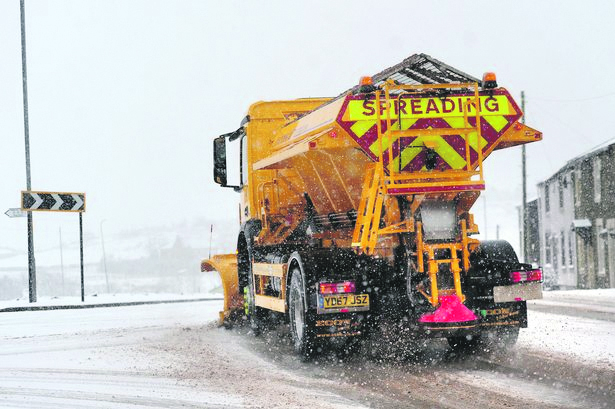THE NEW 20mph speed limit in Wales should not affect winter gritting in Flintshire, council officers have said.
Flintshire council’s environment and economy scrutiny committee met to discuss the county’s winter maintenance service.
The service works to ensure highway networks are safe and available during adverse weather conditions from around October through to April each year.
Highways network manager Barry Wilkinson told councillors that gritters covered 70,000 kilometres of Flintshire’s roads last year using 7,000 tonnes of grit salt.
He added that call-outs were increasing year-on-year, but over the summer drivers had been recruited and trained ahead of winter, and equipment has been maintained and calibrated.
Chairing the meeting, Shotton East and Higher Cllr David Evans (Lab) asked whether Wales’ imminent reduction in the default speed limit in urban areas from 30 miles-per-hour to 20mph would impact gritting.
“What impact do you envisage with the 20mph roll-out on the service?”, he said.
Officers confirmed that during the Buckley and Mynydd Isa trial period of the new speed limit, the gritting round only took eight minutes longer to carry out.
They added that as 70 per cent of the route was housing estates gritters could not go at 20mph anyway due to parked vehicles and speed bumps.
Chief officer for Streetscene Katie Wilby said: “We’re doing the modelling work at the moment.
“If you look at other local authorities elsewhere in the country they are seeing there will be an impact and they will require an additional gritter.
“They are very large cities though, so I don’t think there is going to be any impact on Flintshire because we’re not a city. We haven’t got as many roads that are going to be 20mph as Cardiff and Swansea.”
Earlier in the meeting Buckley Pentrobin Cllr Mike Peers (Ind) raised the checking and replacement of salt bins, which are also provided by town and community councils, and priority of roads with gradients for gritting.
He also cited the number four bus as a strategic and important commuting route to Mold, Chester and Broughton retail park, and called for that to be prioritised in adverse weather.
Mr Wilkinson said salt bins get depleted during snowfall but are replenished afterwards.
On priority roads he said: “Once resource becomes available after gritting our A roads, if there is snow on the ground or prolonged ice then we will move to roads area by area.”
Ms Wilby confirmed number four route as part of the core bus service would be prioritised.
Saltney Ferry Cllr Richard Lloyd (Lab) said he often received requests for salt bins around sheltered accommodation and footpaths close by.
He asked about whether other staff will be deployed again to drive gritters and fill in for bin men.
Officers confirmed drivers are recruited each season to provide an out-of-hours service and drivers can be deployed from other areas of the department such as grass-cutting or the waste service with minimal impact.
Councillors noted the report on the service and agreed the need to maintain its budget along with earmarked reserves of £250,000.



















